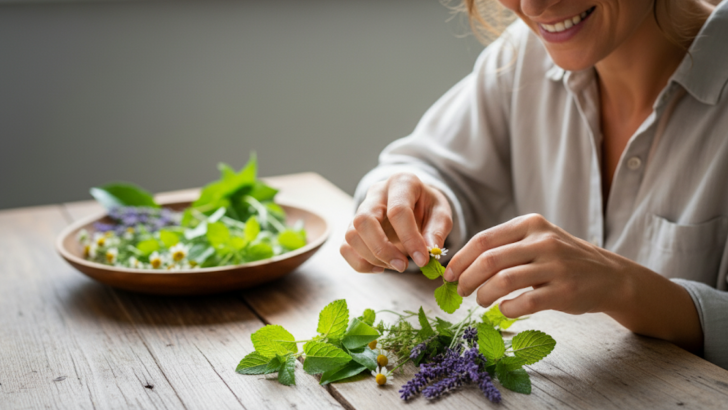When your thoughts won’t slow down and your chest feels tight, it’s easy to reach for another scroll, another snack, or another late-night episode to distract yourself.
But there’s a softer path you can try. For centuries, people have turned to gentle plants to help the mind unwind and the body exhale.
Herbs won’t erase life’s problems, yet they can take the edge off the worry, help you sleep more soundly, and bring back that grounded feeling you’ve been missing.
This list gives you seven calm-bringing herbs with simple ways to use each one. You don’t need a fancy setup or a shelf full of jars.
If you take medications, are pregnant, nursing, or have a medical condition, check with a healthcare professional before trying new herbs.
1. Chamomile

Chamomile is the friend who shows up with a blanket and tells your shoulders to drop. It’s famous for bedtime tea, and for good reason.
The flavor is soft and a little apple-like, and the effect is mellow without being heavy. When you’re restless or your stomach feels knotted from stress, chamomile helps the body relax.
How to use it:
Steep 1–2 teaspoons of dried flowers in a cup of hot water for 5–10 minutes. Sweeten with a bit of honey if you like.
Sip it an hour before bed, or in the late afternoon, to smooth out a rough day. You can also make a stronger cup, let it cool, and keep it in the fridge for a quick calm-down drink.
Good to know:
If you have ragweed allergies, start with small sips to test your reaction. Chamomile pairs beautifully with lemon balm for a sunny, soothing blend.
2. Lavender

Lavender brings calm straight through your nose to your nervous system. One deep inhale and your brain gets the hint that it’s safe to relax.
The taste of lavender tea is floral and a bit bold, but most people love it as a scent. It’s wonderful when your mind is racing, and it can turn a regular bedroom into a little calm corner.
How to use it:
Add a teaspoon of dried buds to tea blends, or steep lightly on its own. For quick comfort, place a drop or two of lavender essential oil on a tissue and breathe in slowly. Make a pillow spray by mixing a few drops of essential oil with water in a small spray bottle. Mist your bedding and take a few long breaths before sleep.
Good to know:
Essential oils are strong, so do not ingest them. Keep them away from the eyes and dilute before using on the skin. Lavender layers well with chamomile or passionflower for a “quiet mind” blend.
3. Lemon Balm

Lemon balm tastes like a bright, citrusy hug. It’s part of the mint family, but gentler, and it’s famous for lifting a worried mood while calming the body.
If anxiety shows up in your stomach or you feel jittery but tired, lemon balm can help smooth things out without making you sluggish.
Many people find it helps them focus by taking the edge off the nervous buzz.
How to use it:
Steep 1–2 teaspoons of dried leaves in hot water for 10 minutes. It’s delicious iced, so you can keep a jar in the fridge and sip during the day. Add fresh leaves to water with cucumber or strawberries for a calm-bright refresher. A small amount of tincture (liquid extract) can be handy when you’re on the go.
Good to know:
Lemon balm plays nicely with chamomile for bedtime and with mint for a daytime lift. If you have thyroid concerns, check with a professional before using regularly.
4. Passionflower

Passionflower is for the nights when your eyes are tired but your thoughts are sprinting laps. It’s gentle, yet it works with that mental chatter that pops up the second your head hits the pillow.
Many people find it helps them fall asleep more easily, and it’s lovely for pre-event jitters or when you’re stuck in a worry loop.
How to use it:
Make a tea with 1 teaspoon dried herb per cup of hot water, steeped for about 10 minutes. The flavor is mild and slightly grassy, easy to blend with chamomile or lavender. Tincture is also popular because it’s quick and portable—use a small amount in water when your mind starts to whirl.
Good to know:
Passionflower may make you drowsy, so use it when you don’t need to drive or do careful tasks. Avoid mixing with alcohol or other heavy sedatives. It’s a star in bedtime blends where the goal is fewer thoughts and deeper rest.
5. Ashwagandha

Ashwagandha is an adaptogen, which means it helps the body adapt to stress over time. Think of it as strength training for your nervous system.
It doesn’t knock you out; instead, it helps shrink that “fight or flight” overreaction so you can handle daily life with more steadiness.
Many people notice they get less rattled, sleep more deeply, and feel a more even energy throughout the day.
How to use it:
Ashwagandha often comes as capsules or powder. The powder mixes into warm milk or a non-dairy alternative with a little honey and cinnamon for a cozy evening drink. Because it’s a tonic herb, consistency matters—small daily amounts over weeks are more effective than a single big dose.
Good to know:
Talk to a professional if you have thyroid issues, are pregnant, or have autoimmune conditions. Ashwagandha has an earthy taste, so blending it into smoothies or warm drinks helps. Pair with tulsi in the morning for calm focus, or with chamomile at night for a deeper unwind.
6. Valerian Root

When you need sleep that actually restores you, valerian root can help. It’s a classic sleepy-time herb used for centuries. Unlike some sleep aids, it tends to help you drift off without leaving you foggy the next day.
The taste is strong and a bit funky – no one drinks valerian for the flavor – but the effect can be exactly what an overamped system needs.
How to use it:
Capsules and tinctures are the most popular due to their taste. If you’re making tea, combine valerian with pleasant herbs like lavender, lemon balm, or spearmint. Take it about an hour before bedtime while you dim the lights and put your phone away so your brain gets a clear signal that it’s time to power down.
Good to know:
Do not mix with alcohol or other sedatives. Some people feel extra drowsy the next morning, so start on a night when you can sleep in a bit.
If valerian doesn’t agree with you, try passionflower or chamomile for a softer approach.
7. Holy Basil – Tulsi

Tulsi is beloved in many traditions as a plant that lifts the spirit while steadying the nerves. If your stress shows up as scattered thoughts, low mood, or that wired-and-tired feeling, Tulsi helps bring you back to center.
It’s calming without being heavy, so it works well during the day when you want to feel peaceful but still clear and alert.
How to use it:
Tulsi tea is delicious—peppery, minty, and a little sweet. Steep 1–2 teaspoons of dried leaves for 10 minutes and sip in the morning or early afternoon. It blends beautifully with rose petals for emotional comfort, or with lemon balm when you want extra cheer. Tinctures and capsules are also easy options.
Good to know:
Tulsi may affect blood sugar and blood pressure, so check with a professional if you manage either. Many people make tulsi a daily ritual—one warm cup, a few long breaths, and a quick note in a journal about how they feel—to build a steady baseline of calm.

Ho sempre sentito una forte connessione con il Divino fin dalla mia nascita. Come autrice e mentore, la mia missione è aiutare gli altri a trovare l'amore, la felicità e la forza interiore nei momenti più bui.

